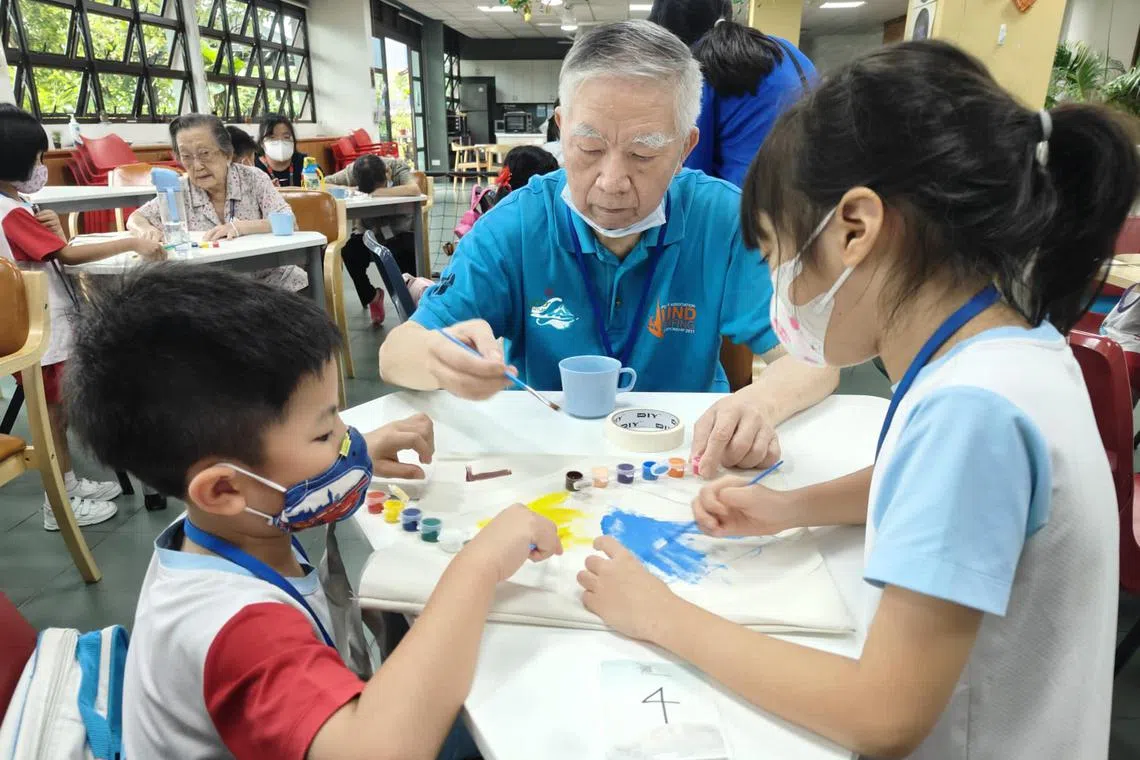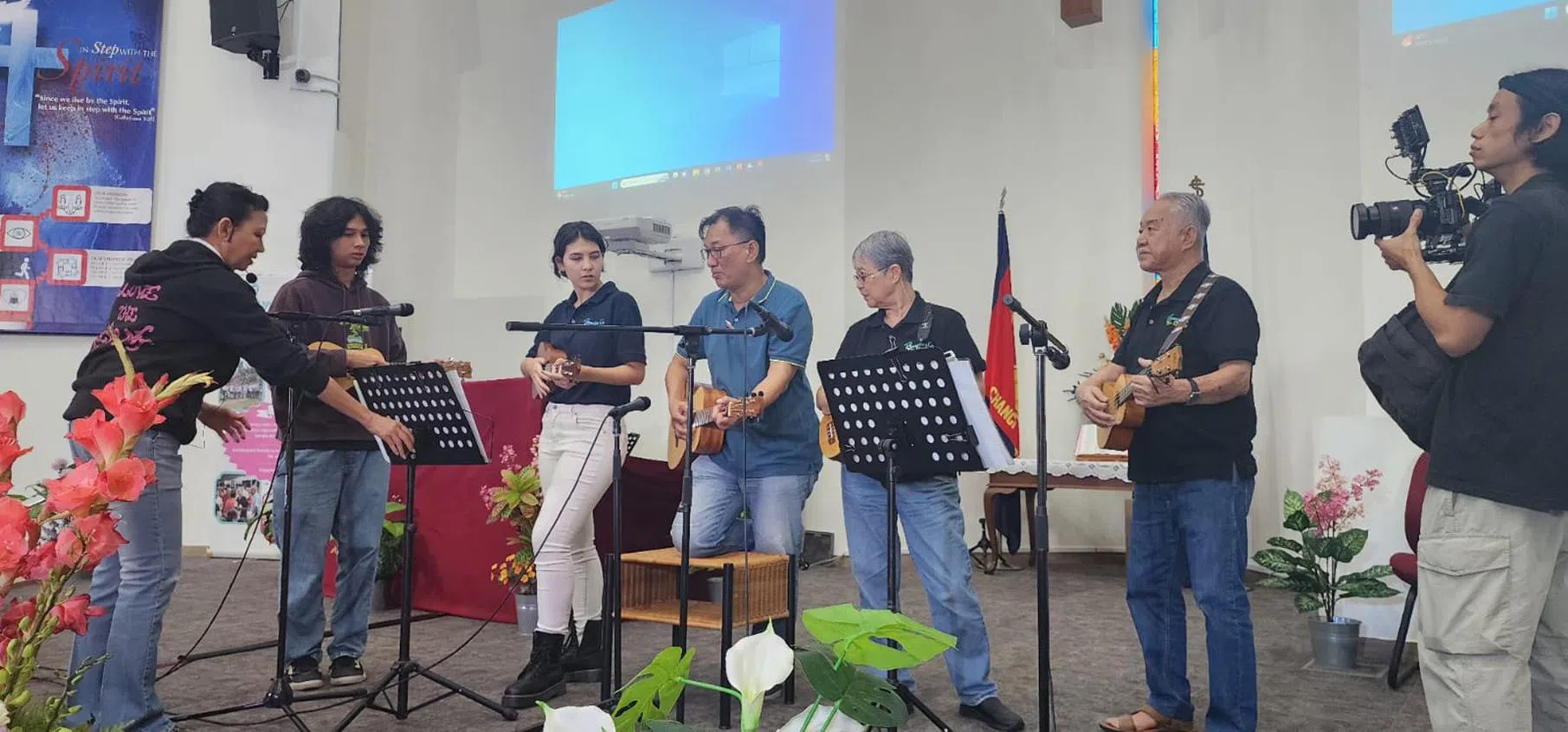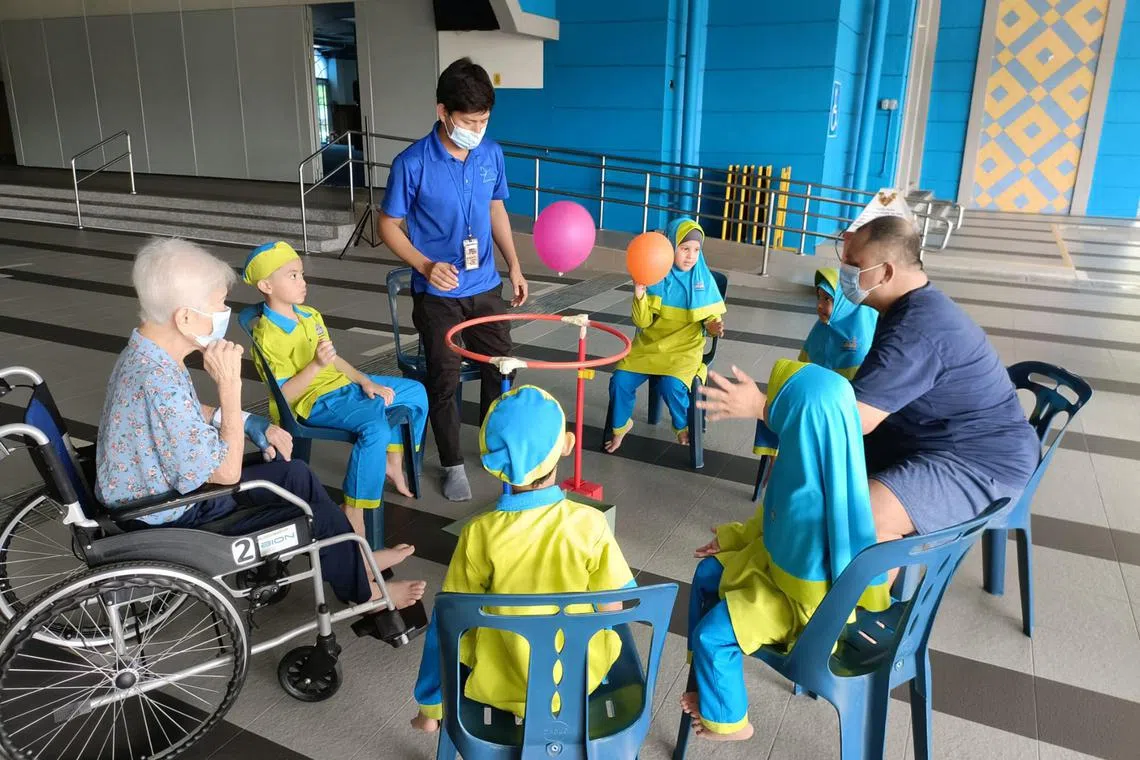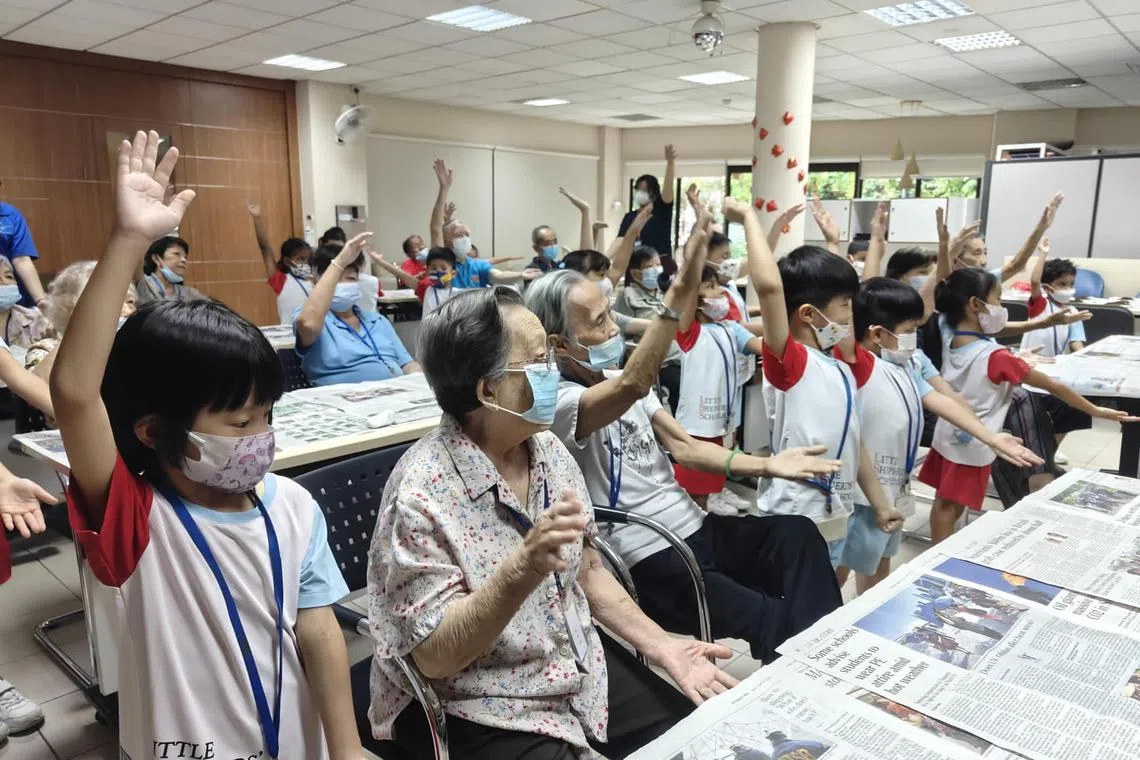Beneficial bonding: When people with dementia interact with kids and youth
Sign up now: Get ST's newsletters delivered to your inbox

Sophie Ngiau (right), enjoys visiting residents of Apex Harmony Lodge with her schoolmates from Little Shepherds' Schoolhouse @ Church of Holy Trinity.
PHOTO: APEX HARMONY LODGE
SINGAPORE – When Mr Jonathan Leong, 19, attended his first Memories Cafe earlier in 2024, he felt awkward and unsure about what to do.
These regular events are organised by social service agency Dementia Singapore to give persons with dementia and their caregivers space to interact with others in a normalised cafe setting.
Mr Leong says: “I was scared because I had never interacted with people with dementia before.”
When attendees were encouraged to dance, Mr Leong and his friends started dancing with an older woman. Soon, he was enjoying himself.
In May, he and his peers organised another Memories Cafe at Singapore Polytechnic, where Mr Leong is in his second year studying media, arts and design.
He now plays music and dances regularly with people with dementia, as a volunteer with ground-up initiative Dementia & Co.
He accompanies their singing sessions and also took part in a talent show held in August. Some of them have taught him old-school dances like the cha-cha.
Mr Leong says he used to think that people with dementia could not be independent at all, or that they were not able to enjoy life.
He knows differently now. “Like other people, they are social. They have hobbies and they’re not bad at them. They’re able to talk to you and sing,” he says.

Mr Jonathan Leong (second from left) performing at a talent show for people with dementia, organised in August by ground-up initiative Dementia & Co.
PHOTO: COURTESY OF ALISON LIM
Ms Alison Lim, who has young-onset dementia – dementia developed before the age of 65 – says Mr Leong’s experience illustrates why it is important for young people and people with dementia to interact.
The 67-year-old co-founded Dementia & Co with her daughter Jamie Lynn Buitelaar.
“Such interaction gives young people confidence to support us and also to not be afraid of growing old,” she says. “They learn what dementia is and is not, and the variety of symptoms people have.”
Inter-generational activities improve the well-being of people with dementia. Experts say such engagement also benefits children and youth, teaching them responsibility, patience and practical skills.
Nearly 200 students from secondary schools and institutes of higher learning have volunteered with Dementia Singapore since April.
Ms Shikin Ahmad, a volunteer management manager with the agency, says about 20 per cent of these volunteers continue after their school programmes end. Many are interested in careers in healthcare or neuroscience.
When coordinating inter-generational activities, it is important to ensure both parties feel safe and comfortable, says Mr Sion Teng, a senior programme executive with Dementia Singapore’s care services.
“It is also important to know that it’s okay if seniors at times refuse engagement, as they can be physically or mentally tired.”
Ms Ng Jek Mui, a senior social worker with Dementia Singapore’s care services, says inter-generational bonding activities can validate and regulate young people’s emotions about family members with dementia. “We’ve had caregivers requesting we talk about dementia with their children, or why grandma is upset, misplacing things or repeating herself in conversations,” she says.
Apex Harmony Lodge, which provides residential services and daycare for people with dementia, receives regular visits from pre-schoolers.

Pupils from Al-Istighfar Mosque Kindergarten with residents of Apex Harmony Lodge, which serves people with dementia.
PHOTO: APEX HARMONY LODGE
Pupils from Al-Istighfar Mosque Kindergarten visit the lodge bi-weekly for an hour each time during the school term – there are two classes involved, each class visiting on alternate weeks.
Children may play games, or do craftwork or music and movement activities with residents.
Kindergarten principal Nur Amalina Zaini says the visits started in 2017, at the lodge’s suggestion.
The lodge conducts a visual presentation for the children, explaining what dementia is and why they may be asked their names a few times.
Pupils get to practise their Malay-language skills with some residents. They also learn social skills such as patience and how to interact with the elderly.
Parents are keen for their children to participate in this programme, she adds. “Some of the children may not have an opportunity to interact with the older generation otherwise.”
Kindergarten pupils from Little Shepherds’ Schoolhouse @ Church of Holy Trinity began visiting Apex Harmony Lodge in 2015.
At first, they were paired with residents once a week during the school term to play with Lego bricks. Then, the teachers suggested more activities, craftwork and games that children and residents could enjoy while also improving their hand-eye co-ordination and motor skills.
In 2022, a mindfulness programme was introduced. The children now lead simple breathing activities for the residents.
Ms Diana Goh, senior executive, corporate development and community engagement at Apex Harmony Lodge, says residents who participate in the inter-generational bonding programme remain cognitively and socially active.
“Since mindfulness was introduced to the programme, we see that the residents are able to manage their emotions much better. For example, a resident who used to get frustrated with the children easily now exhibits patience and understanding when she talks to them,” she says.

Pupils from Little Shepherds’ Schoolhouse @ Church of Holy Trinity do mindfulness exercises with the residents of Apex Harmony Lodge.
PHOTO: APEX HARMONY LODGE
Ms Joyce Pang, who is in charge of the inter-generational bonding programme at Little Shepherds’ Schoolhouse @ Church of Holy Trinity, says pupils reflect on the session afterwards. They are guided to think about what they may have observed and what they might improve on.
They are to think of themselves as facilitators, says Ms Pang. “We tell them they are not going there to play. They are helping the residents.”
Mrs Vanessa Ngiau, 37, a housewife, volunteers at the lodge with her six-year-old daughter Sophie. She says Sophie enjoys being responsible for the older woman she is paired with at the lodge. “It makes her proud. It also helps her practise her Mandarin,” she says.
Mrs Shirley Tan started the collaboration with Apex Harmony Lodge when she was principal of that Little Shepherds’ Schoolhouse branch. She is currently executive director of Catholic Preschool Education (Singapore), which manages seven pre-schools and kindergartens.
Mrs Tan says it is not always easy to get parents on board with the volunteer programme. Some parents may think people with dementia are unhygienic or carry contagious diseases, she says.
“Think about when you are old and your kids say that to you because you said it to them,” she would tell these parents.
Parents’ perspectives also shift as the children exhibit positive changes by going through the programme, she adds.
Ms Wee Kheng Luan, current principal of Little Shepherds’ Schoolhouse @ Church of Holy Trinity, says even parents who initially ask for less participation often change their minds.
“Parents who stay, see the value of this programme,” she adds. “Last year, a mother said that after taking part in the programme, her child was more mindful of grandma at home.”



